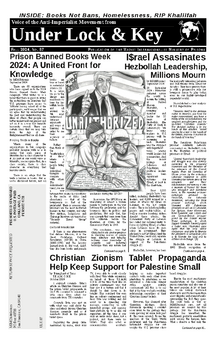
Pennsylvania Drug Situation is a Call to Unity
I am currently incarcerated in Pennsylvania at the State Correctional Institution: Chester. And every day as I look around this place I’m forced to live in, all I see is a growing number of “synthetic snaps.” When I first came to state prison in 2006 drugs were an issue but not like they are today. These new cheaper, and more easily obtainable synthetic drugs such as suboxone or subutex and K-2 synthetic marijuana, are making prison society worse and more depressing than ever. These subs cause withdrawal symptoms like heroin and are causing convicts to throw away their solidarity to scumbag each other in pursuit of their next fix.
Suboxone strips are flat and very easy to smuggle into prisons and all one needs to obtain them on the streets is to test positive for opiates at a clinic to receive up to 90 strips a month for a small co-pay. They then smuggle them into the prisons where they can sell for up to $100 apiece wholesale which is like a 10,000% profit which is irresistible to most “hustlers.”
This new opiate replacement has prisons in an uproar. Convicts are stealing from and robbing each other to get just a little “piece” to chase away their withdrawal symptoms. And our RHUs are filled with “protective custody” inmates who ran up drug debts on credit that they couldn’t cover.
Then we have the so-called “synthetic marijuana” product K-2. I was an avid marijuana smoker on the streets and this stuff is way different than blowin a sacc of loud. K-2 can cause violent outbursts, passing out, seizures, suicide attempts, and serious mental breakdowns. I have seen people attempt to fly over the fence earning them escape charges. People lose touch with reality and lash out at everyone around them. Guys pass out standing up, cracking their heads open, and to top it off a guy on my block at SCI: Somerset went all zombie on his celly biting him on his face and arms. This stuff is more like bad PCP than marijuana. It just blows my mind that synthetics are causing more problems than their “real” counterparts.
We as a united front against the injustice system need to stop trying to capitalize off the downfall of our comrades, and utilize our efforts to solidify our ranks against our oppressors. The rapper Meek Millz is a prisoner here at Chester with me and has stated that even growing up on the drug-laden streets of Philadelphia he couldn’t imagine a cell block in prison so closely resembling a drug block in the badlands of his home city. We can’t continue to give the oppressors more ammo to use against us. I understand that boredom, hopelessness, and other forms of incarceration depression tend to drive us to find ways to numb us. But let’s try to come together and help our comrades strive to kick habits they have already acquired, and to prevent anyone from picking one up.
This is just another battle we need to unite to win. Whether you’re White, Black, or Hispanic, Crip, Blood, Latin, or Aryan, come together for the greater good of convicts everywhere. Pay attention, comrades, because Amerikkka wants to catch us slippin’.
MIM(Prisons) responds: In the November issue of Under Lock & Key we got deep into the issue of drugs in prison. All writers agreed it’s a big problem, though what is used and how the problem plays out varies from state to state and even within each prison. And a lot of folks came to the same conclusion as this comrade: we need to stop trying to make money off the suffering of others and instead come together against the injustice system. This letter is a good follow-up to that issue of ULK because we need to keep this topic front and center as we work to find ways to help people kick the habit and join the revolutionary movement.
Are you helping comrades kick their drug habits? What methods and tactics are you using? What have you tried that didn’t work, and why? What harm reduction tactics can we try to employ? What about counseling techniques? The State isn’t going to fix this problem for us. We need to make our own interventions and support systems.







